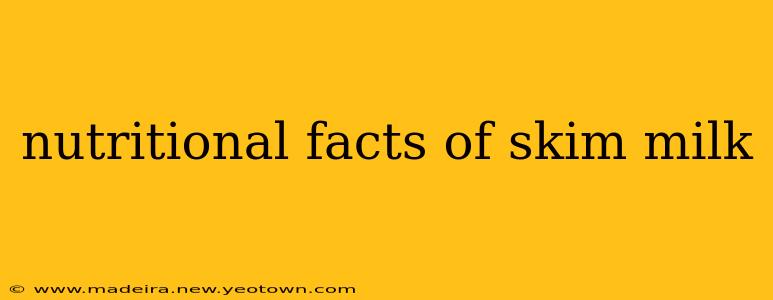Let's be honest, skim milk. It doesn't exactly scream "delicious indulgence" like its whole-milk counterpart. But this nutritional workhorse deserves a closer look. It's packed with essential nutrients, and understanding its nutritional profile can help you make informed choices about your diet. This isn't just about calories; it's about the vital components that contribute to your overall health and well-being. So, let's delve into the fascinating world of skim milk's nutritional facts.
What are the nutritional benefits of skim milk?
Skim milk, stripped of its fat, retains many of the key nutrients found in whole milk, making it a valuable addition to a balanced diet. Think of it as a lean, mean, nutrient machine. It's lower in calories, yes, but it still offers a significant dose of protein, calcium, and other essential vitamins and minerals crucial for bone health, muscle growth, and overall vitality.
What vitamins and minerals are in skim milk?
This is where skim milk truly shines. While the fat is gone, the good stuff remains. A single cup (approximately 240ml) typically provides:
- Protein: A substantial amount, contributing to muscle building and repair.
- Calcium: Essential for strong bones and teeth. Skim milk is a fantastic source, helping to reduce the risk of osteoporosis.
- Vitamin D: Plays a vital role in calcium absorption and bone health. Many brands fortify their skim milk with added Vitamin D.
- Riboflavin (Vitamin B2): Important for energy metabolism.
- Potassium: A crucial electrolyte involved in many bodily functions.
- Vitamin B12: Essential for nerve function and red blood cell formation.
The exact amounts vary slightly depending on the brand and processing methods. Always check the nutritional label on your specific carton for the most accurate information.
Is skim milk good for weight loss?
This is a frequent question, and the answer is a qualified "yes." Because skim milk is significantly lower in calories and fat compared to whole milk, it can contribute to weight management when incorporated into a balanced diet and exercise routine. However, it's crucial to remember that weight loss is a multifaceted process involving overall calorie intake and expenditure. Skim milk alone won't magically melt away pounds, but it can certainly be a helpful tool.
Is skim milk good for building muscle?
Absolutely! The protein content in skim milk is a major player in muscle growth and repair. Protein provides the building blocks for muscle tissue, aiding in recovery after workouts and promoting muscle growth over time when paired with a consistent exercise regimen. Therefore, skim milk can be a valuable addition to a muscle-building diet.
How many calories are in skim milk?
One cup (about 240ml) of skim milk typically contains around 80-90 calories. This is significantly lower than whole milk, which can contain more than double the calories. This lower calorie count makes skim milk a popular choice for those watching their weight or seeking to reduce their overall calorie intake.
Does skim milk have any downsides?
While skim milk offers many benefits, it's important to be aware of potential downsides. Some people find it less palatable than whole milk due to the lack of fat. Also, because fat is removed during processing, some fat-soluble vitamins (like vitamins A and E) might be slightly lower in concentration. However, these deficiencies are generally minimal and easily offset through a well-balanced diet.
Conclusion: The Verdict on Skim Milk
Skim milk emerges as a nutritional champion, offering a wealth of vitamins and minerals with a lower calorie count. It's a valuable asset in a healthy diet, supporting muscle growth, bone health, and overall well-being. While individual preferences and dietary needs vary, understanding the nutritional profile of skim milk empowers you to make informed choices that best suit your lifestyle and health goals. Remember to always check the nutrition label on your specific brand for the most accurate details.

